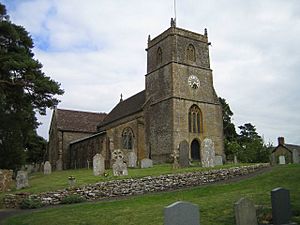Church of St Mary, Hardington Mandeville facts for kids
Quick facts for kids Church of St Mary |
|
|---|---|
 |
|
| Location | Hardington Mandeville, Somerset, England |
| Built | 1123 |
|
Listed Building – Grade II*
|
|
| Official name: Church of St Mary | |
| Designated | 19 April 1961 |
| Reference no. | 1345795 |
| Lua error in Module:Location_map at line 420: attempt to index field 'wikibase' (a nil value). | |
The Church of St Mary is a very old church located in Hardington Mandeville, a village in Somerset, England. It was built way back in 1123! This church is considered a special historical building, known as a Grade II* listed building, which means it's very important and protected.
Contents
History of St Mary's Church
This church was first built in 1123 on the same spot where an even older church might have stood. Over the centuries, it has been carefully looked after and updated.
Restoration and Changes Over Time
Big repairs and changes, called restoration, happened in the 1400s. Later, in 1864, more major work was done during the Victorian era. This included rebuilding the chancel, which is the part of the church where the altar is.
The church also has a clock mechanism that was put in place before the year 1707. That's a really old clock!
The Church of St Mary is part of a group of churches called the Coker Ridge benefice, which belongs to the Diocese of Bath and Wells.
Architecture and Design
The Church of St Mary is built from a special local stone called hamstone. This stone gives the church its unique look. The roof is covered with tiles.
The Ancient Tower and Bells
The church's tower is very old, dating all the way back to the original building in 1123. It has three main sections, or "stages." Inside the tower, there are six bells. Three of these bells were made by the Purdue foundry, with the oldest one cast in 1591. Two more bells were added to the tower in 1974.
Unique Features Inside the Church
You can find a round font inside the church. A font is a basin used for baptisms. This one is believed to be from 1123, just like the church itself! It's also made of hamstone and has cool carvings around its edge. It stands on a round base.
In the sanctuary, which is another important part of the church, there's a triangular carving of a strange beast with a beak. No one is quite sure where this carving came from, and it's not made from local stone. Some experts think it might be in a style called Ringerike, which was used by the Vikings.

